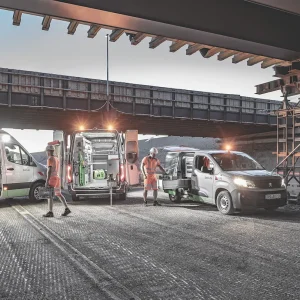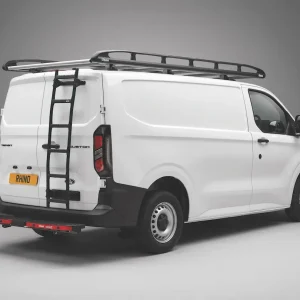Given that vans are subjected to much harsher conditions and treatment than cars, it’s no surprise that, when the time comes to sell them on, many have bumps, scrapes or scratches. However, just a bit more TLC can be beneficial to vendors, and ensure that they maximise the value of the vehicles at auction.
“The remarketing rules for vans are really no different than they are for cars – proper preparation and good presentation are vital if your LCVs are going to achieve the best possible price in the auction hall,” says Duncan Ward, BCA’s UK business development manager – commercial vehicles. “And with the current high demand for well-presented vans, there is a massive opportunity for sellers. On any used van, condition is important – panels should be straight and clean, and trade name deletion must be done to a good standard.”
Ward highlights BCA’s Smart Preparation – the process of bringing vehicles back to so-called showroom condition – through paint technology, cold metal dent removal and repairs to interior and trim – as one approach that can make a difference. “The technologies involved help vendors maximise returns in the auction hall, by ensuring vehicles look their best when they are sold,” he explains.
Smart repair would be cost- effective on a 10,000-mile 2011 van in good condition but with a few small dents for example, says Ward, who warns that not all vehicles will yield such a positive outcome: “The return on the investment to bring a 100,000-mile, five- or six-year-old van, without a straight panel to its name, back to showroom condition is likely to be less rewarding.”
Lucy Hill, head of operations at leasing firm Hitachi Capital, believes there are further financial benefits to keeping vehicles in good condition.
“If a vehicle is returned to us in a good condition, it not only shows that a driver has looked after it, but they won’t be subject to any penalties. If there is interior damage, the penalty is directly linked to the cost of repair,” she says.
Hill also advises caution when considering the type of policy at the beginning of a contract because a vehicle that has operated on a one-driver, one-vehicle rule will be able to command a good price, but with other deals, it is more difficult.
“Where companies have multiple drivers for a vehicle, they suffer with resale value, and when the van comes back to us with damage, we have to bring that vehicle up to the same standard as the one-driver, one- vehicle level,” she explains. “But even where there are multiple drivers, best practice companies will operate within a defect management policy, as outlined by [the FTA’s] Van Excellence scheme, and this is where we can mitigate the risk. No customer likes a surprise at the end of a contract, and penalties will be at the end of the contract.”
Inside out
Damage to a van’s exterior might be easy to spot, but Ward and Hill both agree that an interior in good condition is equally, if not more, important.
“Selling unprepared vans sends all the wrong messages to buyers and particularly affects the end-user buyer, who has a considerable presence at most commercial vehicle sales these days,” says Ward. “While a trader or dealer will see a dirty van and try to buy it below-book to polish some profit into it, the end-user buyer will often draw the conclusion that the van has not been cared for and will move on to another vehicle.”
Cabin, seating and dashboard damage will discourage many buyers because it is difficult or expensive to repair, reasons Ward: “A builder’s van, for example, with paint over the seats, and concrete ground into the carpets, will require those items replacing as they are effectively irreparable. Damage to a dashboard will often require an expensive replacement, too.”
Hill advises that looking after the inside of the van will help add value when it comes to remarketing.
“Interior damage is often seen to affect values a lot more than exterior damage,” she states, adding that damage to the seats, dashboards and carpet provide the biggest financial hit for operators. “The costs involved in repairing these items can be very high, while parts can sometimes be hard to source, and, as a result, the penalties that we would have to charge at the end of a lease are directly linked.”
Sometimes vans can get sold regardless of condition, but this approach shouldn’t be taken for granted, says Ward: “Buyers’ approaches can vary widely – some are happy with vans that need extensive reconditioning because they have the facilities to manage that process, but that will be reflected in their bidding. Others will only buy to order, or only consider LCVs in near ready-to-retail condition.”
In Hill’s experience there is a small percentage of people who will buy certain vehicles, regardless of condition. “Generally, the only time that damaged vehicles can command a premium price is when they are very desirable with a good specification, such as a VW Transporter Sportline, or a very rare vehicle, such as a Sprinter LWB in a colour,” she says.
Not only is importance placed on how the van’s interior appears, but also what it contains. Specification can play a big role in resale values, with certain must-have items that can help vehicles stand out at auction.
“The load area should be ply-lined to stop inside-out damage, and the rear doors should be solid – no windows for prying eyes to see a builder’s toolbox, for example,” says BCA’s Ward. “Side loading doors and high-rooftops are often favoured, and don’t forget the driver – they work in the van, so comfort is just as important to them as it is to a car driver. If you are selling a fully loaded example, with every manufacturer extra, including metallic paint, you really will get the buyers’ attention.”
The value of a full service history and all appropriate documentation and spare keys when it comes to remarketing shouldn’t be overlooked, says Ward, who says BCA offers a service called Docusafe that manages this process for volume sellers.
“In the remarketing arena, a full set of documents is highly valued by professional buyers when offered with the vehicle at the time of sale,” he says. “The presence of the V5 means no delays in onward selling, while a full service history shows the vehicle has been well maintained by the previous owner and confirms that a warranted mileage is correct as declared.
“And it is the latter that can have a real, tangible effect on the potential prices vehicles might achieve. Building buyer confidence is hugely important and even hardened trade buyers value the comfort of knowing their judgement is supported by a comprehensive history file.”
The advice from Hill is to keep all servicing and maintenance details, regardless of who carries out the work.
“Maintenance history commands a higher value because you can see that a vehicle has been kept in a good condition throughout its life. The relevance of a main dealer or authorised dealer work isn’t so much of a consideration – it is more important that the event has been undertaken,” she reasons. “If they have been done by a premium garage it would add value, but that is a ‘nice to have’ option.”
There are still opportunities to sell damaged vehicles, but it is very dependent on the model and type of vehicle being remarketed.
“It does vary, but tolerance of a generally acceptable level of damage would be higher on large panel vans, dropsides and tippers than medium and small LCVs,” confirms Hill. “If you have a lifestyle vehicle such as a double cab, or high-spec VW Transporters or Mercedes-Benz Vitos, the tolerance of damage and poor condition is very low. The people that are buying it would look at it more how you would view a car, so it is veryimportant to get them back in good working order and good condition.” For those that cannot view in
person, or prefer to buy over the internet, BCA has a new initiative that offers extra peace of mind. Video Appraisals allow buyers to view every aspect of both the exterior and interior of each vehicle, helping them to decide on the condition of the vehicle, says BCA.
“LCV buyers have found the BCA Video Appraisals service to be helpful when planning their ‘shopping list’ as it delivers information on condition – both inside and out – efficiently and effectively,” says Ward.
“For Live Online buyers – who do not get to see the LCV ‘in the metal’ – Video Appraisals have been anecdotally described as the next best thing to actually being there.”





